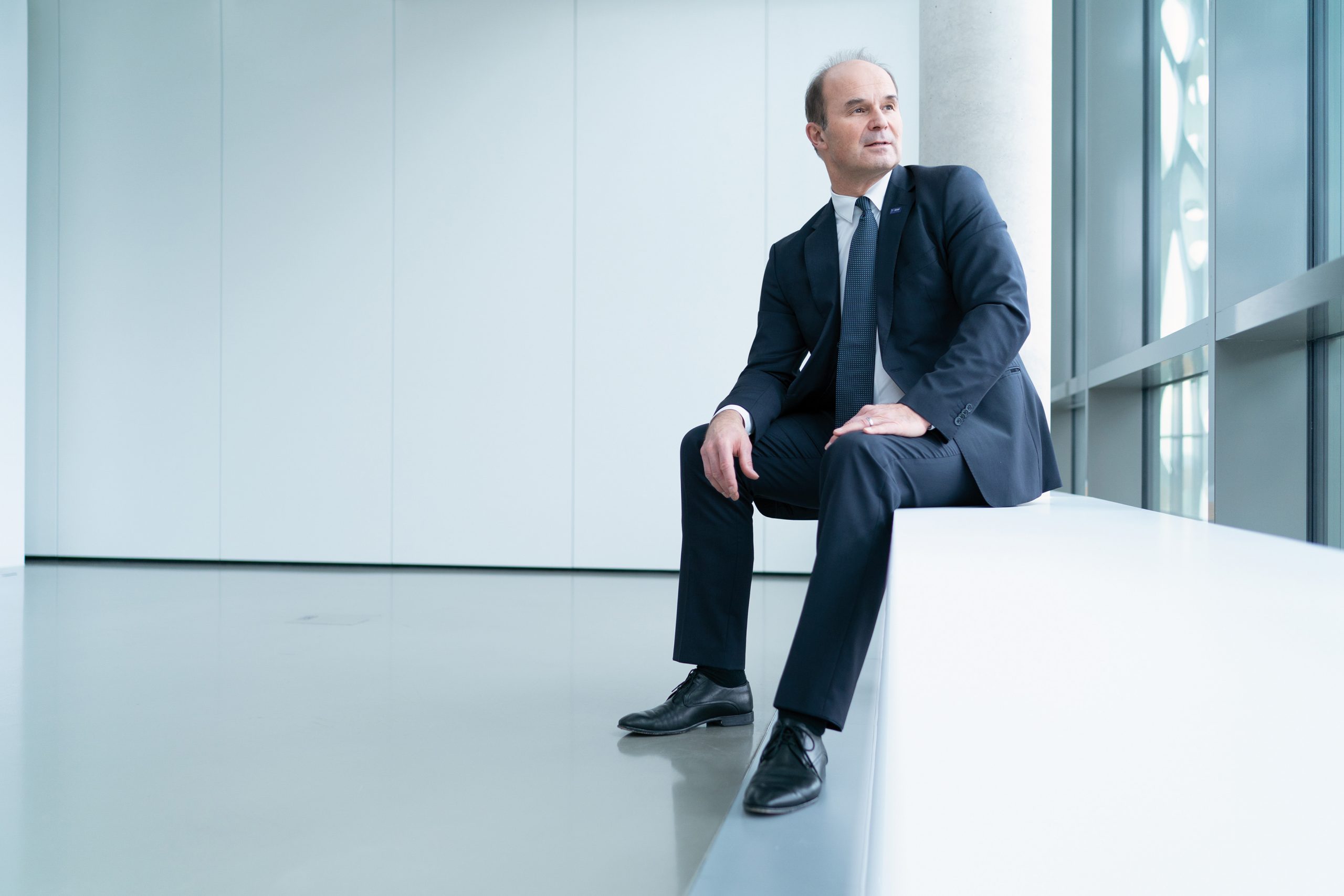10.06.2021
BASF Chairman of the Board Dr. Martin Brudermüller on the importance of a quantum computing ecosystem for Germany and Europe
Quantum technologies will trigger a series of disruptive innovations, says BASF Chairman of the Board Dr. Martin Brudermüller. In an interview, he explains what we can expect from this new technology, the challenges involved in its development and why now is exactly the right time to establish an industry consortium like QUTAC.

Dr. Brudermüller, let’s take a look into the future: How will quantum computing change industry?
In many ways. Quantum computing will trigger a chain of disruptive innovations that have the long-term potential to fundamentally change our industry. We will become better, faster and more sustainable through this technology.
What specific innovations can be expected from quantum computing?
Using the chemical industry as an example: The core of our activities is the production of chemical products, i.e. molecules and materials. The use of quantum computing will disruptively change the development of such products. First of all, this means massively accelerating product development, because quantum computing enables the precise, rapid modeling of chemical reactions in addition to the properties of molecules. But it also brings the study of larger molecules within reach. This will help us to develop better products in a shorter time.
You’ve talked about how the use of quantum computing could also help companies become more sustainable. What opportunities do you see here exactly?
Improved simulations, for example, is one of the possibilities offered by quantum computing. The modeling will allow us to produce using less energy and raw materials and thus reduce our carbon footprint. Another opportunity is in optimized logistics, which will allow us to bring our products to our customers even more efficiently.
Why is a dedicated quantum computing ecosystem so important for Germany and Europe?
Quantum computing will become an important leading technology for almost all industries. It is therefore essential to enable future innovation. Of course, this has been recognized not only in Europe, but also in China and the USA, where the exploitation of quantum technologies is already further advanced.
So Germany and Europe are under pressure?
Let’s put it this way: The time of waiting and watching is definitely coming to an end. That is why I am pleased that Germany has succeeded in defining a roadmap and that we can finally start implementing measures. QUTAC is part of this development. But it is only a first step. Politicians must not rest on their laurels. Business and politics must now work together in a focused manner on implementation, always keeping Europe in mind. That’s why we must not close our minds to international cooperation, because we can’t do it alone. The European Quantum Industry Consortium (QuIC) is a right and important step in order to keep up with global competition. Sovereignty means being on par with the best in the world and being able to choose the best option.
What can we expect from QUTAC in the future? Which application fields will the consortium and its members focus on?
The goal will be to prioritize, develop, and communicate industrial use cases that can serve as role models and demonstrate the value of quantum computing to demonstrate business impact. Commercially viable quantum applications are essential to create new demand for quantum technologies and initiate a virtuous cycle of supply and demand. Applications to be developed by QUTAC members will involve logistics and transportation, chemistry, and finance, and will span cryptography, machine learning, optimization, and simulation.
“To help the quantum computing ecosystem take off, it’s critical that we in the business community join forces and focus on the most important issues.”
What challenges make it difficult to elevate quantum computing to the level of large-scale industrial applications?
We have two major tasks ahead of us: On the one hand, we must create the necessary conditions in Germany and Europe to be able to build quantum computers at all. On the other hand, we must also be able to use them profitably and start developing the corresponding applications together now. Special attention must also be paid to the area of talent & education: As the technology matures, the demand will increase for competent personnel who can not only program, but also model the challenges in such a way that we can solve them with quantum computing. Here, politics, industry and science must work hand in hand.
How can QUTAC as a cross-company consortium help to overcome these challenges?
To further develop quantum computing towards an industrial application, we need to act now. As we have seen with artificial intelligence, for example, early investment is essential to secure a competitive advantage in a fast-moving digital economy. To help the quantum computing ecosystem get off the ground, it is critical that we all join forces. This is the only way we will have a chance to compete with the big companies in the USA and the efforts in China.
At QUTAC, companies from sectors as diverse as technology, chemicals, pharmaceuticals and automotive, come together. Don’t the different requirements of so many industries make collaboration difficult?
Not at all. The great diversity of the industries represented in QUTAC and the associated opportunity to learn from each other makes collaboration particularly exciting. Again, diversity only makes a team more successful.
When can we expect the first successes in the field of quantum computing?
The development time can vary greatly from use case to use case, ranging from five to more than ten years. At BASF, we expect that in the next ten years the first application areas of quantum computing will be mature enough to provide concrete added value. Making quantum computing usable is not a sprint. It will be a marathon.